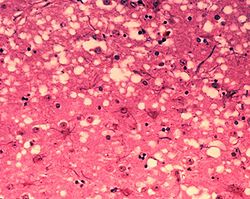Prion
A prion (pronounced pree-on) is an infectious protein. The word is short for "proteinaceous infectious particles".

All known prion diseases in mammals affect the structure of the brain or other neural tissue. Right now, they cannot be treated and always end in death.[1]
Prions cause many forms of encephalitis, or brain disease, such as scrapie, chronic wasting disease, Creutzfeldt-Jakob Disease, bovine spongiform encephalopathy and kuru. Prions work by changing the shape of proteins in infected animals. While normal proteins have lots of alpha helices, or twisted parts, changed proteins have lots of beta sheets, or flat parts. It has also been suggested that Alzheimer's disease causes damage to the prions. [2]
Because prions are proteins, and proteins cannot reproduce themselves, it is a mystery how prions work. A lot of molecular biology research is going on to find out how they reproduce themselves, with no clear result so far.
Related pages
changeReferences
change- ↑ Prusiner SB (Nov 1998). "Prions". Proceedings of the National Academy of Sciences of the United States of America. 95 (23): 13363–83. Bibcode:1998PNAS...9513363P. doi:10.1073/pnas.95.23.13363. PMC 33918. PMID 9811807.
- ↑ Kellett, Katherine AB; Hooper, Nigel M (2009). "Prion protein and Alzheimer disease". Prion. 3 (4): 190–194. doi:10.4161/pri.3.4.9980. PMC 2807690. PMID 19887909.